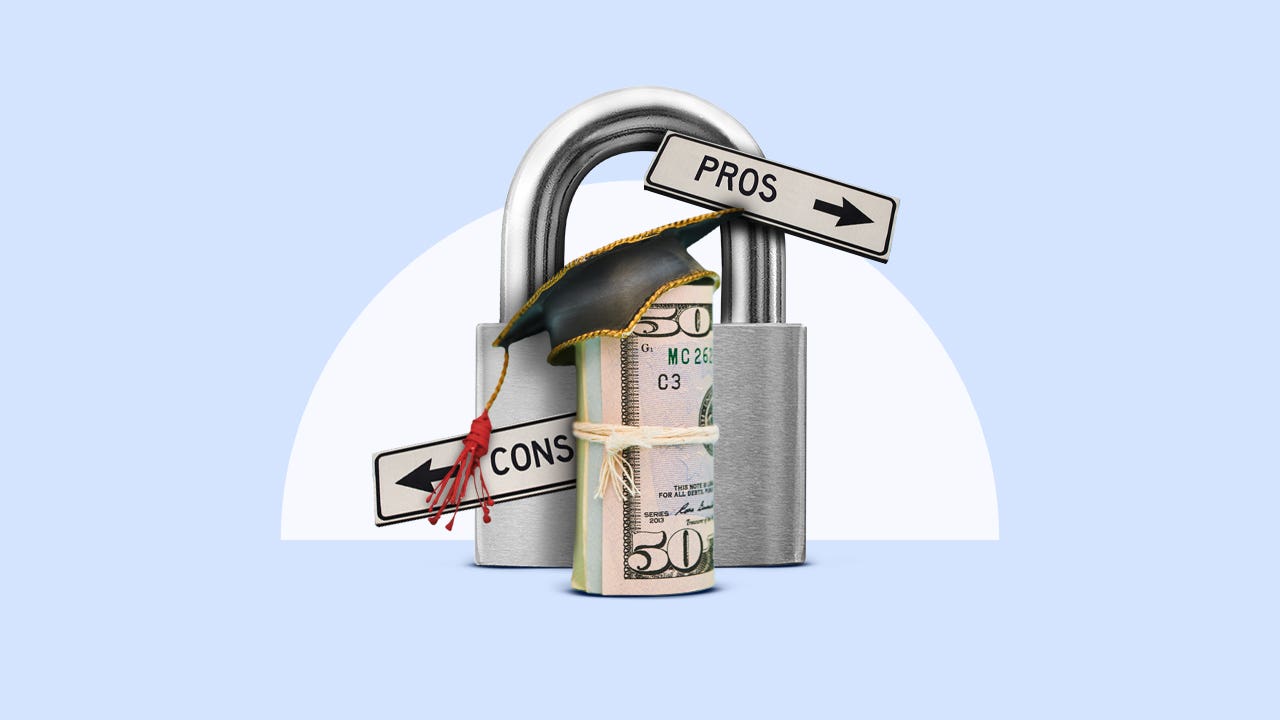Pros and cons of private student loans




Key takeaways
- Private student loans may offer higher borrowing limits and potentially lower interest rates compared to federal loans, but they lack benefits like income-driven repayment plans and loan forgiveness.
- Private student loans may also be tax deductible, but they can carry the risk of potentially not being discharged in bankruptcy and persisting after death.
- The application process for private student loans is typically fast, but it’s important to carefully consider the terms and potential risks before borrowing.
Private student loans come with higher loan limits and — sometimes — lower borrowing costs compared to federal loans. However, private loans also have limitations. For example, you won’t get access to income-driven repayment plans, loan forgiveness options (if you’re eligible) and government-exclusive benefits. You could also spend more than you anticipated in interest if you have a lower credit score or lack a cosigner.
4 advantages to private student loans
1. Can be cheaper than federal loans
The advertised interest rates for the best private student loans start at under 3%. If you or your cosigner have a solid income and a high credit score, a private loan may offer you a low interest rate with no upfront fee. Keep in mind, though: The annual percentage rate (APR) for private loans can vary significantly based on the lender and terms.
If you’re an undergraduate student, you likely won’t find anything cheaper than a federal student loan, unless you have a cosigner, such as a parent, with excellent credit. The Department of Education’s graduate and parent student loans are pricier, in terms of rates and fees, than its undergraduate loans. Still, it’s wise to compare what you might qualify for with private lenders and what the federal government offers.
2. Higher borrowing limits
If you’re attending an expensive school, you may not get the amount you need if you only go through the federal government for student loans. For instance, if you’re an undergraduate student, you can borrow between $5,500 and $12,500 per year, depending on your year in school and dependency status. The lifetime maximum is $31,000 for dependent students and $57,500 for independent students.
3. Quick application process
You must file the Free Application for Federal Student Aid (FAFSA) to access federal student loans. It typically takes up to an hour to complete and three to five days to process if you submit it online. The processing time for paper applications is seven to 10 business days.
By contrast, most private lenders feature a much more streamlined application process. You can generally apply online, upload requested income documentation and get approved and funded within just a few business days.
However, even if you plan to exclusively use private student loans, you should still file the FAFSA — it’s the best way to find out if you’re eligible for work-study, grants and other financial aid at your college. Your school and state financial aid offices will also likely use your FAFSA results to determine your eligibility for other awards.
4. Broad qualification requirements
Private loans can serve students who aren’t eligible for federal loans, such as:
- Students enrolled in fewer credits than the eligible amount
- International students with a U.S. citizen or permanent resident cosigner
- Borrowers who have reached federal borrowing limits
Private student loan requirements center mostly around your finances and credit score, so they may be an especially helpful option if you do not qualify for other types of financial aid, such as need-based scholarships.
5 disadvantages to private student loans
1. No access to income-driven repayment or forgiveness
Unlike federal loans, private loans do not offer income-driven repayment plans or Public Service Loan Forgiveness. This can make them a bad fit for borrowers facing financial hardship or pursuing lower-paying careers in public service.
The only way to lower monthly payments for your private education debt is through refinancing your student loans to a lower interest rate or longer repayment term, but keep in mind that those with financial hardships or are lower income may find it hard to qualify for refinancing (at least without a cosigner).
2. Interest rates based on creditworthiness
In some cases, you can qualify for lower interest rates with private lenders than the federal government offers. However, private lenders offer a range of rates, and unless your income and credit score are stellar, you may end up with a much higher rate.
It’s also important to note that the lowest private student loan interest rates are generally variable, fluctuating over time with market conditions. If you get a variable-rate loan, your monthly payment could increase while you’re in repayment. To avoid this, opt for a fixed rate.
Many private lenders allow you to apply with a cosigner, such as a parent, which can improve your chances of getting favorable terms.
3. No federal subsidy
Undergraduate students with proven financial need may qualify for subsidized federal student loans. With these loans, the federal government pays your interest while you’re in school, as well as during your grace and deferment periods, if applicable. With private loans, though, there is no subsidy, so you’re on the hook for all the interest that accrues on your debt.
4. Limited deferment and forbearance options
Though these options are standard for most federal student loans, deferment and forbearance options are not guaranteed with private student loans. The availability of these payment pauses may depend on your lender’s unique terms and are typically awarded on a case-by-case basis, at the lender’s discretion.
5. Debt may persist after death
Your federal student loans are discharged when you die, which means your estate isn’t on the hook for outstanding balances. This isn’t always the case with private student loans, though. Most lenders write the debt off, but some may try to recoup what they’re owed from your estate. If the claims are successful, the inheritance left to your loved ones could be negatively impacted.
Private student loans vs. federal student loans
In most cases, turn to federal student loans first if you need help financing higher education after free money options have been exhausted. With that said, most federal loans limit how much you can borrow each year and in total — and borrowers with excellent credit could find lower interest rates with private loans.
| Feature | Private student loans | Federal student loans |
|---|---|---|
| Income-driven repayment | ✓ | |
| Loan forgiveness | ✓ | |
| Interest rates | Set by lender based on credit | Set by Congress |
| Subsidized options | ✓ | |
| Deferment/forbearance | Varies by lender | ✓ |
| Borrowing limits | Up to full cost of attendance | Federal limits |
| Eligibility | Credit/income-based | No credit check usually |
| Tax-deductible interest | ✓ Up to $2,500 annually | ✓ Up to $2,500 annually |
Bottom line
Private student loans can be a valuable source of funding when federal financial aid isn’t enough to cover all educational costs. They may offer higher borrowing limits and lower rates for well-qualified borrowers. However, they may also come with significant risks.
Before choosing a private student loan, consider all repayment options, interest rates and lender policies. Federal loans typically provide better protections, such as income-driven repayment and forgiveness options.
Borrow only what you need and compare multiple lenders to find the best rates and terms for your financial situation.
Why we ask for feedback Your feedback helps us improve our content and services. It takes less than a minute to complete.
Your responses are anonymous and will only be used for improving our website.



